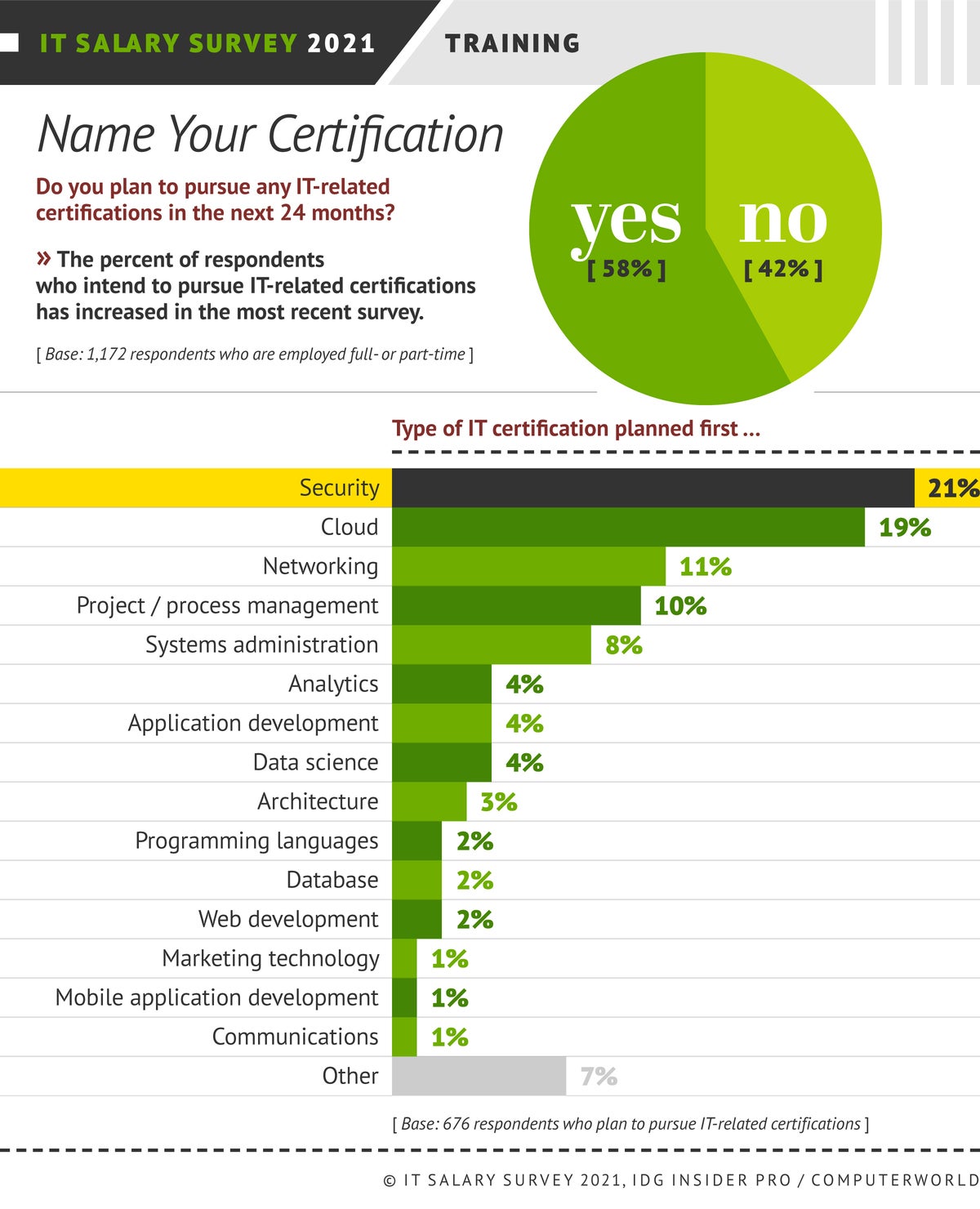- The Relationship Between Network and Security: Why They're Ditching the "It's Your Fault" Game
- 72 hours later with Galaxy S25 Ultra - the AI hype is getting real for me
- Revolutionizing Investigations: The Impact of AI in Digital Forensics
- I tested Samsung's $1,300 Galaxy S25 Ultra - and I'm slowly becoming an AI phone believer
- Can you make an AirTag last 10 years? It took me a seconds to do it
IT Salary Survey 2021: Security and cloud computing certifications on the up

Investing time, effort and money in technology certifications to improve understanding and competency across a range of technical skills certainly adds value from a personal development perspective but what does it actually mean in terms of job prospects and salary increases? Are all certifications equal or are some more valuable than others?
The 2021 IDG Insider Pro and Computerworld IT Salary Survey of 1,172 IT professionals tried to understand current thinking on certifications and to garner some real-world experiences on how they are viewed by employers. With IT skills shortages rife – recruiter Hays claims that 84 percent of employers say they are affected by skills shortages, with shortages in the IT, construction, life sciences, and property industries all exceeding the US national average – you would expect employers to focus time and energy into training. Is this really the case?
According to our survey, 64 percent of respondents currently hold IT certifications, up from 59 percent on last year’s survey. While 36 percent don’t hold certifications, the fact that nearly half of respondents claim that having certifications helped land a job, pay rise or promotion, could mean that figure could change over the course of the year.
In which technology areas do we currently see the most certifications? Top of the certification charts are IT pros working in security, where over 79 percent hold certifications. Next is cloud computing, with over 77 percent, followed by networking at 71 percent.
Given the rapid acceleration in digital transformations as a result of the COVID-19 pandemic, we would expect to see a demand for increased certifications, especially in some of the hot technology areas, such as cloud, apps and security. However, while 39 percent claimed that certifications played no role in career advancement, return on investment of certifications, at least for a large proportion of IT pros, remains in question.
And yet many see the coming months as an opportunity for self-improvement. While certifications may or may not have immediate benefit in influencing job prospects and earnings, some certifications are perhaps more valuable than others. Has this led IT pros to at least consider pursuing certifications in the next 12 months?
“I want to get more experience and knowledge in cloud proxy, VDI and security,” said a Japan-based systems analyst, in what was a typical comment on how many IT professionals see 2021.
Our survey found that well over half of IT professionals (58 percent) are looking to pursue IT-related certifications this year. This is a notable increase on last year’s figure of 50 percent. Like last year’s survey, security, at 21 percent, came out top in terms of the certifications most IT pros would pursue, although the number has fallen a little from our 2020 survey figure of 28 percent. The real growth area is, as expected, in cloud computing. Up from 15 percent in last year’s survey, 19 percent of IT pros said they would pursue cloud computing certification over the next two years. Networking (11 percent), project/process management (10 percent), systems administration (eight percent) and analytics (four percent) also featured.

The pursuit of technology certifications does loosely match the demand for IT skills, outlined in our analysis of hiring data. Top of that tree were application development, cloud computing and security, so it stands to reason these would be key areas of certification investment. What is also apparent, at least from some respondent comments, is the need to use skills to build personal profiles but also create a broader knowledge and resilience.
As one New York systems analyst said, “In the next 12 months I want to use my skills to help my organization, to modernize key systems. Personally, I want to build transferable skills and retain my current level of employment and salary.”
It’s an example of how some IT professionals are thinking but what about certifications and technologies in less demand? What is bottom of the pile and losing its sparkle?
Going down. Certifications in increasingly less demand
Communications, marketing technology and mobile application development rank very low (all one percent). Programming languages and database certifications do not fare much better, with both at two percent. While this may reflect the limited relevance of these certifications to modern technology growth areas, what is surprising is that there is little correlation with what IT leaders deem to be skills that are no longer a top priority, as we revealed in our hiring analysis.
Other factors such as outsourcing could come into play, with some organizations preferring in-house teams to gain certifications in growth areas such as cloud and security. If an organization needs a website built, there are plenty of options in terms of agencies and gig economy workers that could fill the gap.
“I want to be in a job where my skills are valued and provide me with the projects according to my skills, not just any data entry type work,” said one India-based web developer, as if to illustrate the point further.
It’s understandable that all IT professionals want to be valued in their work and feel relevant to their employer. Certifications are one way of proving competencies, which could potentially elevate individuals in the eyes of IT leaders, or perhaps they are regarded as part of the process and not linked to opportunities and change. If anything, it seems to come down to individual employers. If it wasn’t, we would expect to see greater numbers chasing certificates, and qualifications becoming industry norms across all technologies.
However, as we saw in our job satisfaction research, skills development, education and training are becoming increasingly important in a list of important factors for IT professionals. Only time will tell if the pandemic has influenced learning in anyway.

